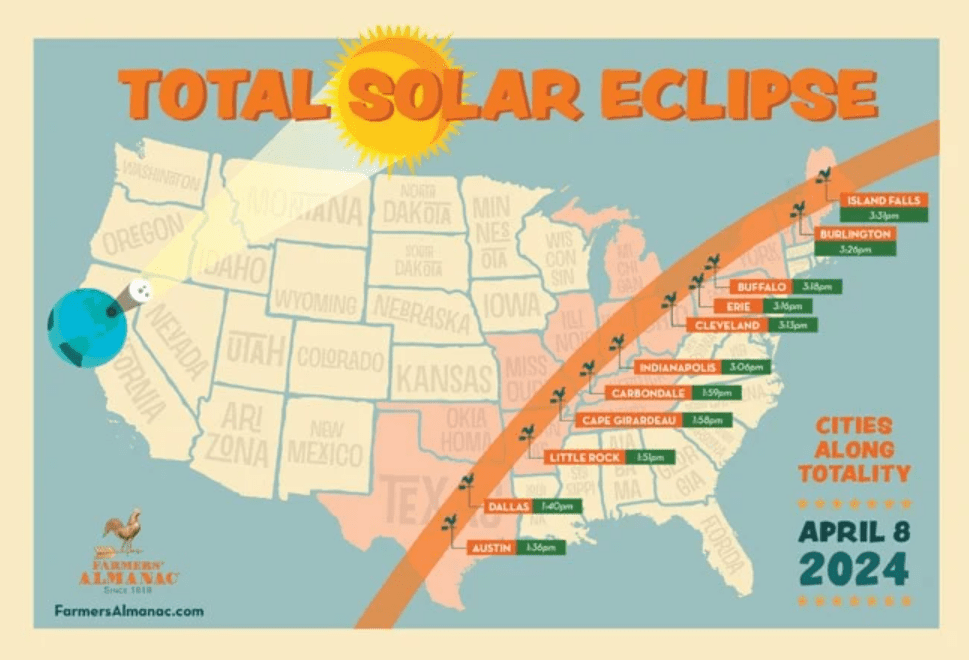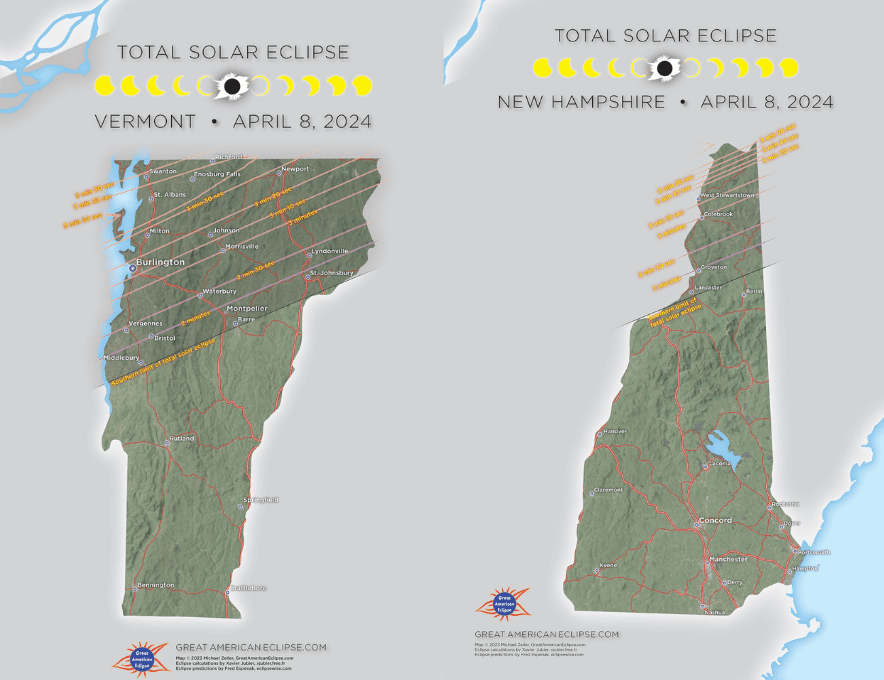
On April 8, a total solar eclipse will trace a narrow path of totality across 13 states, including northern Vermont and New Hampshire. The moon will fully cover the sun, causing up to 3.5 minutes of darkness between 3:20 pm and 3:30 pm.
This rare event is expected to attract up to 250,000 visitors between the two states. People are expected to arrive in the days leading up to the eclipse on April 8 and leave shortly after its conclusion. Heavy traffic and disruptions in cell service are possible.
This increase in visitors to rural areas during the eclipse raises unique concerns for farmers. We are sharing additional information and resources to help farmers prepare for potential impacts.
1. Farmers should take appropriate measures to secure their property and minimize unauthorized access
There’s an increased potential for unexpected visitors to your farm. Although visitors are discouraged from doing so, authorities expect they will park their cars wherever possible to view the eclipse if they are not at their destination when totality occurs. Depending on the proximity of fields and barns, visitors may stop at your farm during the eclipse.
Actions to take ahead of the eclipse include:
- Identify potential dangers that could appear open, interesting, or attractive to visitors
- Remove keys and lock cabs for all equipment
- Lock shops and storage areas
- Secure all ladders to grain bins, silos, hay lofts, etc.
- Restrict access to manure pits and lagoons with gates or barricades
- Post “no trespassing” signs at points of entry to barns and fields
- Inexpensive options, like flagging tape, can serve as a barrier and restrict visitor access to identified areas
Farmers are encouraged to post signage stating this is an active dairy farm. You can download 11×17 signs here, which can be printed at your local print shop or Staples.
You should also familiarize yourself with your state’s trespass laws (Vermont/New Hampshire) ahead of the eclipse. If a situation warrants, contact your local law enforcement.

2. Plan ahead for farming activities, including hauling
Traffic in Vermont and New Hampshire on April 8 and the surrounding days is expected to cause major delays on state highways and interstates. This is important to consider if you are hauling livestock and other time or temperature-sensitive products. Delays of up to 9 hours have been experienced in other states during past solar eclipses.
Visitors and locals may seek alternative routes on county roads. This could lead to heavy trucks on impassable roads, causing more delays. These roads were not designed for heavy traffic and springtime in northern New England can bring frost heaves and soft road conditions.
If weather and field conditions are favorable, farm fieldwork may occur during these time periods. However, farming activities could be delayed due to increased traffic and travel on rural roads. Farmers will be sharing the roads with motorists unfamiliar with large agricultural equipment.
Here are some things that you can do to prepare:
- Fuel up in advance and schedule deliveries before the eclipse, if possible
- If you must travel on April 8, check the live traffic updates, including New England 511 and Waze
- Take an inventory of feed, bedding, medications, etc. in advance
- Inspect your hauling equipment and tractors, making sure all lights and reflective materials are clean and functioning properly
3. Expect potential visitors and be kind
Authorities expect visitors may stop and ask to use the restroom if traffic delays occur and to ask for directions if cell phone service is unavailable. It’s important to treat unexpected visitors who pose no threat to you, your workers, or your farm operations with kindness. We want visitors to leave with a positive impression of dairy and our region’s dairy farmers, and you never know who may be recording your interaction.
Locals and visitors are excited to capture this once-in-a-lifetime experience. This means there will be more people with cameras and, potentially, drones. Under federal law, it is a felony to willfully damage or destroy a drone. We understand that drones can interfere with agricultural activities and disturb livestock. If this occurs, try to locate the operator or contact local law enforcement.
4. Report incidents, if necessary
If an incident occurs during the solar eclipse, be prepared to react and report. Remember that local law enforcement or emergency service response times may be delayed. Document any incident that happens right away.
5. Reach out to us for help
Our Farmer Relations team lives in Vermont and is here to support farmers as they prepare for and experience the eclipse. If you have questions, need additional resources, or experience an incident on the farm during the eclipse, don’t hesitate to get in touch with Farmer Relations Manager Elicia Pinsonault at 617-380-3941 or Farmer Communications Specialist Steve Peters at 617-286-5894.